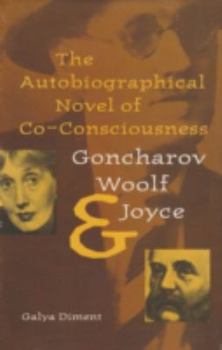The Autobiographical Novel of Co-Consciousness: Goncharov, Woolf, and Joyce
From the Foreword by Bernard Benstock:
"A fresh and imaginative contribution to comparative literary criticism . . . in a psychological examination unrestricted by existing dogmas."
"The reader's initial sense of surprise soon gives way to a sense of discovery, thanks to the author's well-formulated and theoretically sound introduction of a new side of these texts."--Peter Barta, Texas Tech University
In a comparative study, Galya Diment draws a novel comparison between two giants of Modernism and a relatively obscure nineteenth-century Russian Realist, claiming that the three writers all reinvented the idea of duality in literature. Focusing on Woolf's To the Lighthouse, Joyce's Ulysses, and Goncharov's A Common Story, she introduces and refines the idea of "co-consciousness" as the mechanism that allows each work to transcend the genre of the autobiographical bildungsroman and the classical tradition of duality, represented by the doppelg nger.
Defining co-consciousness as the means by which writers fictionalize what appear to be equally conscious sides of their personalities, she argues that this concept is the telling distinction between these three "divided-they-stand" writers and the "divided-they-fall" approach of other celebrated masters of the double. A crucial feature of the three writers is their tendency to tolerate the split personality as an inevitable yet not life-threatening condition.
Diment presents strong evidence that the fictional split self often functions not only as an expression of a writer's inner conflicts but also as a powerful and conscious artistic tool. For Woolf, Joyce, and Goncharov, she writes, the fictional alter ego appears to act as a critical buffer between the writers themselves and their autobiographical material.
The author discusses at some length the extent to which the concept of "simultaneous consciousness" is psychologically valid, and she pays considerable attention to the dual nature of the periods that formed each writer's sensibilities. She ends the main part of the book with Ulysses, she says, because she believes that in this novel "the co-conscious split autobiograpical self has found its perfect home."
Galya Diment is associate professor of Russian at the University of Washington in Seattle. She is the coeditor of Between Heaven and Hell: The Myth of Siberia in Russian Culture and the author of the forthcoming 'Pniniade': Vladimir Nabokov and Marc Szeftel, as well as many articles on Russian, English, and comparative literature.





